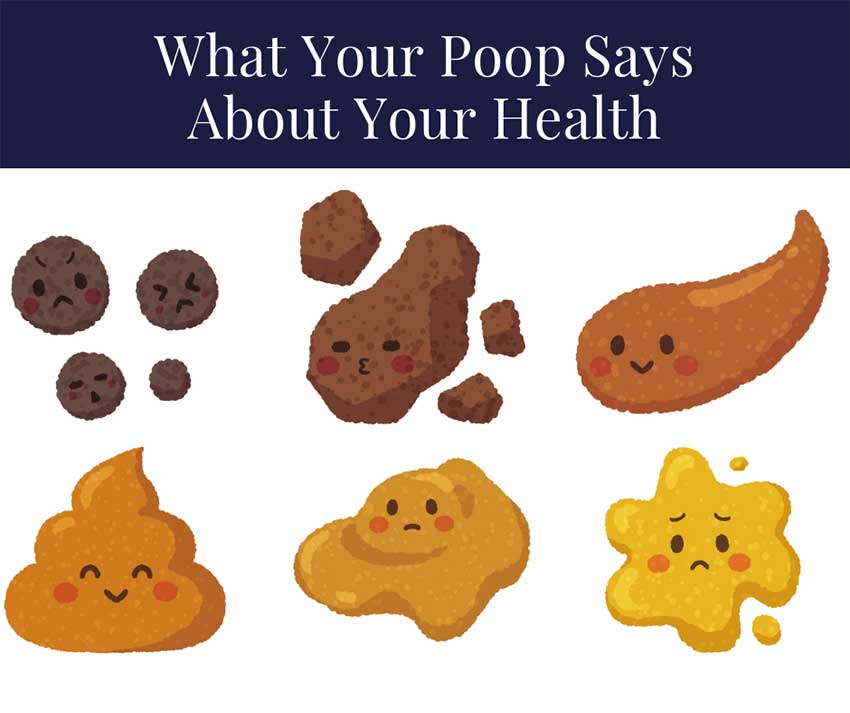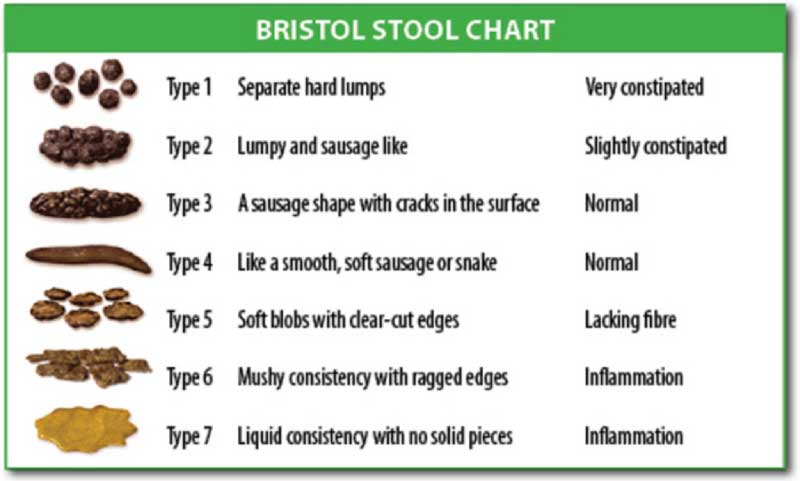Do You Know What Your Poop Means about Your Health?
Poop may not be a topic everyone likes to discuss, but your daily poo can tell you a lot about your health. Your doctor may not have asked you about it, but it’s important to know that most diseases and issues begin in your gut. So, looking at what is coming out your gut gives you a good idea about what’s happening in there.
First, there are three main things that might give clues into your health:
- Frequency
- Form
- Color
Frequency of Bowel Movements
The first thing you have to think about is the frequency of your bowel movements. It is best to have at least one complete movement per day. Some people have two to three bowel movements per day – that’s normal too!
Everyone has different amounts for several reasons. Some people have faster metabolisms or more robust, good bacteria. Some people have a higher quantity of food that they consume each day.
Now, if you are eliminating more than three times per day, that starts to enter the category of diarrhea. Also, while some people claim having bowel movements every few days is okay, many doctors disagree. We cannot forget that it is how your body eliminates toxins, acids, and other unwanted materials. Daily is best.
Form of Your Bowel Movement
This topic sounds fun, right? Don’t get squeamish – it’s natural! The form of your poo is important, but people shy away from discussing it. You want your poo to be well-formed, which indicates that we digested and assimilated the nutrients from the food we consumed. It also means we are eliminating acids and toxins correctly.
Let’s take a look at the different forms you might experience.
- Separate hard lumps, similar to little balls that are hard to pass
- Sausage shaped, lumpy
- Sausage shaped but has cracks on its surface
- Similar to a sausage or snake that is soft and smooth
- Soft blobs with clear edges that is passed easily
- Fluffy pieces with ragged edges with a mushy texture
- Watery with no solid pieces and is entirely liquid
Do you know what form is the best? Number 4 is the winner! The ideal form of poo is a tubular shape, very similar to bananas. It shouldn’t break apart when you flush. When you eliminate, the poo should come out easily without straining, smell like super-ripe fruit rather than something gross, and requires very little wiping.
You would rather be a 3 than 5 or 6. That is moving more towards the realm of diarrhea, and diarrhea is hard to control. The issues causing chronic diarrhea tend to be harder to fix, and it also means you have an issue with malabsorption, which means your body isn’t receiving proper nutrients.
What to Do about Frequent Loose Stool
If you are leaning towards forms 5 and above often, there are a few things you can do. First and foremost, speak to your doctor! Don’t be shy; doctors can order comprehensive stool analysis.
In the meantime, you can try to firm up your stool by using the popular BRAT diet. You might have heard of the BRAT diet when you are sick. BRAT stands for:
- Bananas
- Rice
- Apples or Applesauce
- Toast or Tea
These foods were picked because they have tannin-like qualities that can help firm up your stools for a better bowel movement. Another option is consume one or two teaspoons of food-grade bentonite clay each day that helps to bind and absorb toxins.
One of the best things you can do is take a day probiotic. Probiotics increase the good bacteria that lives in your gut. Also, eliminating things like glute, wheat, nuts, and too many grains is a wise idea, at least until your gut is healed and healthy again.
What about Stool that is Too Hard?
Hard or infrequent stool is an uncomfortable problem, and you should head to your doctor to figure out whats going on inside of your gut. A thyroid paniel might help figure out the issue.
Until your doctor solves your issue, there are a few things you can do. First, try adding a magnesium supplement to your diet, and eat magnesium-rich foods. Magnesium is important because it brings water into your bowel, which means stool softer and easier to eliminate. It also will relax the muscles around your intestinal walls, which helps with constipation.
Probiotics can also help with chronic constipation. Many people swear by adding cod liver oil and other healthy fats into your diet helps to keep bowel movements going, along with certain nuts and seeds. Pears and fresh fruit will keep you regular.
Last Concern – The Color of Your Poo
Well, the last thing you should consider is the color of your poo. Yes, even that makes a difference! A normal stool should be medium to dark brown in color.
If your stool is black, you need to seek medical care immediately. It could be a sign of blood in your upper GI tract. Yellow or green poop might indicate fat malabsorption, liver or galbladder stress.
Remember your stool can change color because of the foods you eat. Food dyes are a culprit for different colors. If you eat bright green icing on a birthday cake, your stool might be a disturbing color for a day. Don’t freak out unless it continues! Consuming a lot of beets can make your stool turn a reddish-color. Think about what you eat recently first before worrying.
Does Floating Mean Anything?
Many people tell you that whether or not your stool floats is an indicator of your health. Doctors tend to have their own opinions about this. Some claim floating is better because it indicates fiber in your diet. However, some say floating means that your body isn’t absorbing fats.
So, most doctors do say that sinkers is better. The most important thing is how you feel. You can have either and feel comfortable.
Don’t Forget to Take a Peak in the Toilet
Most of us flush and forget about it, but paying attention to whats in the toilet can be an eye-opener. Bowel movements can let you know you are dehydatred or if you are eating correctly. It is like a window into what’s happening in your body, letting you know if your gut is healthy. A healthy gut means you’re doing something right!
 Home and Gardening Ideas At home and Gardening ideas we believe inspiring readers about homesteading, self sufficiency
Home and Gardening Ideas At home and Gardening ideas we believe inspiring readers about homesteading, self sufficiency








One comment
Pingback: What Your Poop Says About You